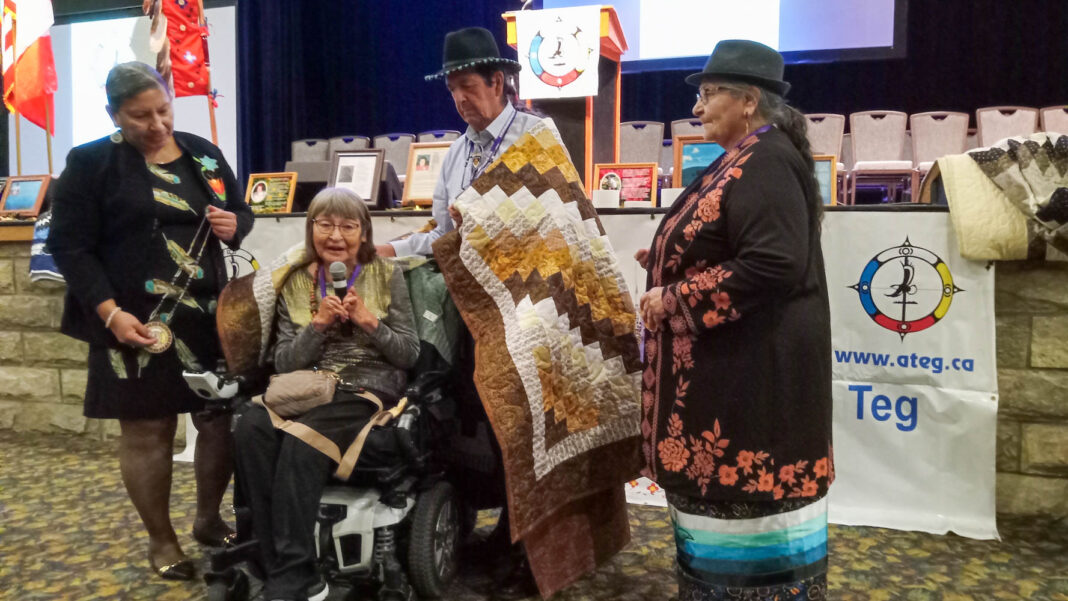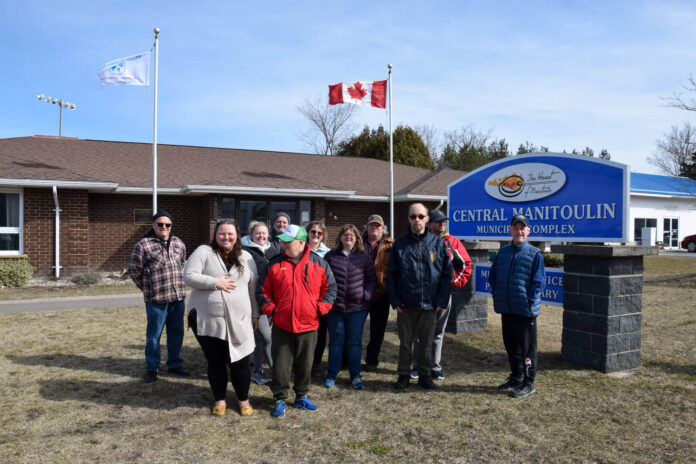by Gina Gasongi Simon
SAULT STE. MARIE, Mich.—This year’s Anishinaabemowin-Teg 2024 “Zaagtoodaa Anishinaabemowin” (Let’s Love Our Language) was an overall success, thanks to the 994 attendees and 362 elders present. The annual language conference was celebrating 30 years and has grown to become one of the largest gatherings of its kind along the shores of the Great Lakes.
“It was amazing to have a large contingent of fluent Anishnaabe speakers gathered under one roof for the three-day gathering!” exclaimed organizer Elizabeth (Liz) Osawamick of Wiikwemkoong.
According to Ms. Osawamick, ‘Anishnaabemowin Teg’ translates to “where the language is at” and with the continued growth year after year “shows how dedicated and drawn the Anishinaabeg are to the beautiful sounds of our mother tongue that has been held in sacred trust by our ancestors,” Ms. Osawamick explained.
From beginning to end the gathering assembled some of the most prolific and accomplished Anishnaabe speakers like Elder Stanley Peltier who stressed the need to find solutions from within our ‘language bundle’ to reconnect with Anishnaabe language, songs and rhythms. Mr. Peltier expressed strong beliefs about adaption. “We should not be adapting to the settler’s language to teach our language, those methods have nearly obliterated the sophistication and profound connection to our inter-related being with the universe,” he explained.
“As we continue this process to adapt to a foreign language, our worldview, our thought process and philosophies are becoming mere translations to English without the proper connection and interpretation of those voices, that manifest our identity and connection to the universe,” he cautioned.
Alan Ojiig Corbiere’s presentation focussed on how the Anishinaabeg used pictographs to visually convey information to each other, to tell our stories to other nations and to colonial entities. His slideshow contained photos of pictographs, copies of maps and petitions to demonstrate our ancestors’ ways of creating and transmitting records of monumental events. Mr. Corbiere concluded by encouraging teachers and students to incorporate the materials into their curriculum.
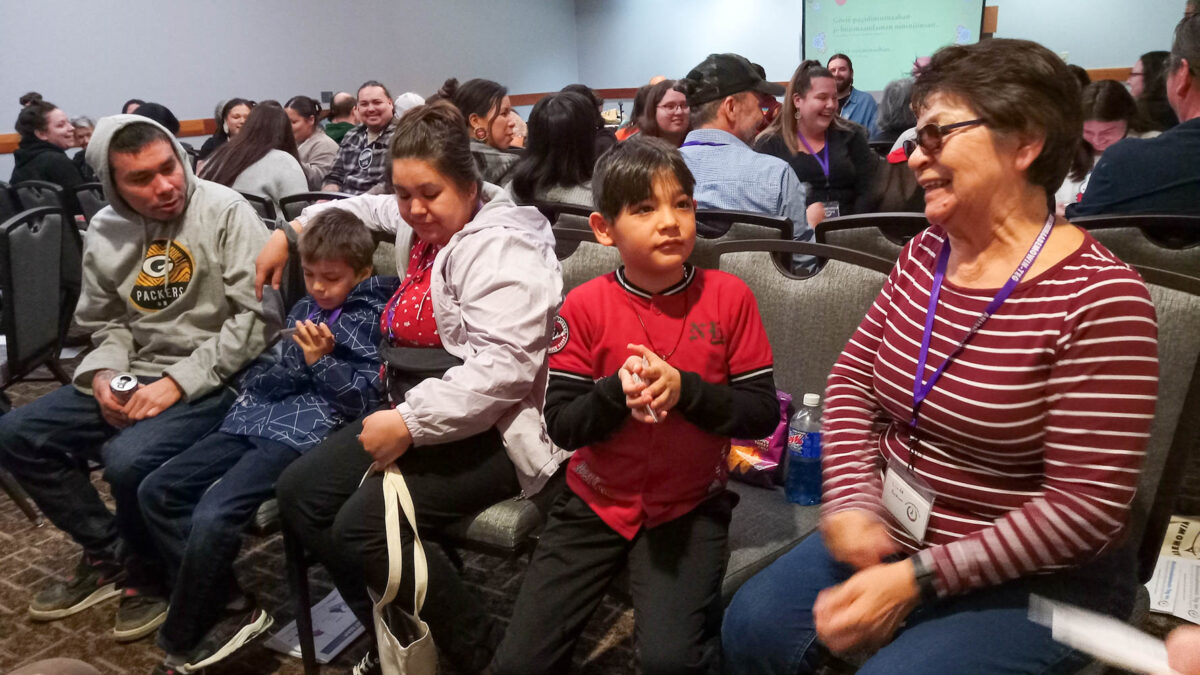
Dr. Shirley Williams did a fine job presenting ‘how Anishinaabe can age with grace,’ Ni gchi piitizing Anishinaabe-kweyaang ni zhiwendaagoee-gdaa-kiigaadeseng. Her sense of humour tied in with her own life experiences shed light and laughter to re-learning how to be dependent on someone and at the same time unlearning about independence.
“All our combined experiences in life help us to become who we are; some are happy and some sad, but if we accept and learn to laugh at ourselves, at the foolish things we’ve done, then we can continue with the laughter as we age,” Dr. Williams said. “We will have good days and bad days, but we must continue utilizing the healing power of laughter, as you climb the four hills on our journey with life.”
Nokomis Martina Osawamick presented on the seven stages of life using Indigenous knowledge from the beginning of Bimaadziwin, ‘living the good life,’ and ceremonies as a core component in her cultural teachings. She shared how she has applied these teachings throughout her life with her children, twelve grandchildren and three great grandchildren. “Maintaining and revitalizing the Anishnaabemowin language has enabled me to leave a legacy for my future generations. The healing of language and ceremony have helped me past the Residential school experience in Spanish.
Mary Ann Corbiere has been teaching Anishnaabemowin since the late 1980s and producing manuals for introductory and intermediate courses. Her latest project has been to produce an Anishnaabe dictionary and continue to design advanced level courses. Her presentation focussed on the kinds of patterns contained within the Anishnaabe language, juxtaposed with her attempts to use English to explain abstract grammatical concepts.
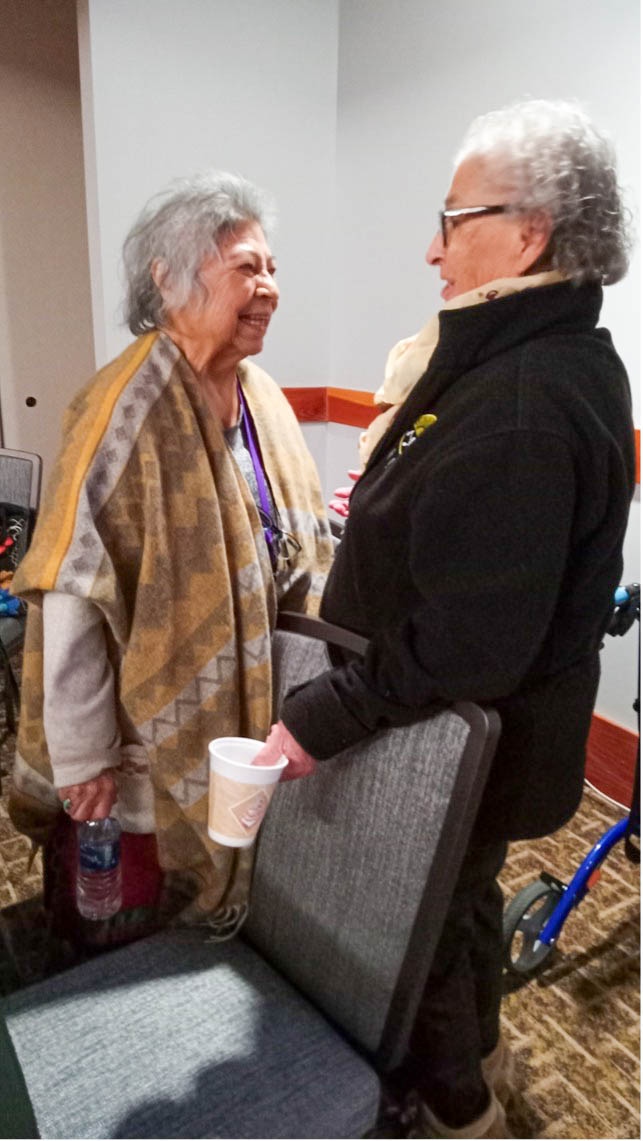
Wiikwemkoong Ogimaa Rachel Manitowabi along with elder and father Eugene Manitowabi, teamed up to present an up-close personal insight into their private life and public life as elected leaders in Wiikwemkoong. Both shared their knowledge of helping others to learn and speak the language. They presented terms and teachings of how they honour and abide by the values of the Seven Grandfather teachings of Respect, Humility, Truth, Bravery, Love, Wisdom and Honesty.
Thecla Neganegijig’s perspective on Anishaabemowin was from a land-based angle. She provided basic language to help revitalize the learners understanding and respect of mashkiki, medicines. Combined with her colorful slideshow and incorporation of the alphabet, she explored words for traditional medicines and linked them with spiritual teachings.
The Wiikwemkoong Anishinaabemowin Kinoomaagewin, presented by Program Manager Sandra Peltier and her team of Darlene Peltier and Jason Pangowish, talked about the importance of teacher collaboration and feedback. “We work closely with the teachers to design appropriate materials that suit their classroom needs and curriculum. We encourage the students to do the work, to become part of the designing and production of language materials.” As Ms. Peltier explained, “we are blessed with some of the most fluent elders like Josephine Peltier, Rita Corbiere, Phyllis Williams, Steven George, just to name a few. They are there to assist us in refining, reading, revitalizing and assisting with intervention and promotional strategies.”
The material samples presented were phenomenal and a number of participants attending this workshop were disappointed they could not purchase or obtain any of the materials presented. One woman commented, “I feel like a kid in a candy store, look but don’t touch.”
Longtime language teacher and presenter Phyllis Williams discussed the benefits of healing through the use of Anishnaabemowin. She acknowledged her 106-year-old grandfather, mishomis and nokomis for her traditional teachings and preservation of the language. She credits them for the woman she is today and the opportunities to pursue different avenues to obtain her education and life experiences. “I have been encouraged to pass on my traditional teachings and language skills to whomever has the desire to learn. Our language will grow through sharing. We can’t keep it inside us, we need to speak, that is its purpose. It is up to us to recognize our Anishnaabe language and using it as a process of healing and growing stronger.”
Also part of the incredible work by the organizers and language keepers was the artists, crafters and musicians that created ways to express and carry on the life line of original communication. Those in attendance could attest to the fine intricate work by these gifted artists and designers.
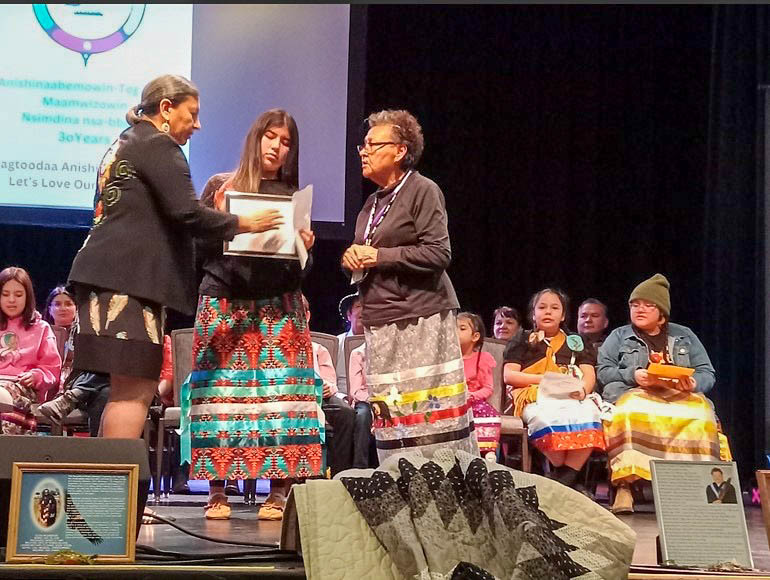
Next to the registration station and elders’ room were tables adorned with cedar and candles to honour 16 influential speakers, who are now passed into the spirit world. Their photos, along with brief highlights of their contributions to keeping the Anishinaabeg language alive and well. It was a touching gesture and reminder of the volume of knowledge that our elders have and its our duty and responsibility to make every effort to learn, to treasure and appreciate their legacies and their wealth of teachings, so vital to our culture’s survival.
Friday evening’s Scholarship Award Banquet was a chance for the youth to showcase their Anishinaabemowin talents in recognition of the 16 memorial acknowledgements. The memorial Scholarship Recipients were: Robert Trudeau and Rosemary Roy (Linda Peltier-Trudeau baa), Beloved Wemigwans (Florence/Lily Osawamick baa), Delilah McGregor (Olive McGregor baa), Janelle Dokum (Clarence Leo-Sagassige baa), Deacon Jacko (Violet McGregor baa), Nawaatin Assinewe (Jean Shawana baa), Charlise Eshkawkogan (Dominic Eshkawkogan baa), Kihanna Toulouse (Rose Logan baa), Naawaaka Roote (Orien Corbiere baa), Teirney Fox (Ellen Migwans baa), Danica Peltier (Marjorie Mishibinijima baa), Lila Garcia (Victor Keshigo baa), Avery Toulouse (Dorothy Toulouse baa) and Larry Assinewai (Mary Lou Fox baa).
Following the award presentation swere a few impromptus from the daring audience participants. Lifetime Achievement award was presented to Harvey and Delores Trudeau by board members Liz Osawamick and Barbara Peltier.
Friday’s keynote address by Barbara Nolan, Language Commissioner for the Anishnaabek Nation, spoke about the value of the language and the need to acknowledge the strength it provides to the Nation, as “our language Anishinaabemowin is how we stay connected with our culture and identity. Ms. Nolan shared firsthand her experiences at Indian Residential School and the attempts made behind closed doors to discourage and punish the children for speaking their mother tongue. She encouraged the need to continue developing materials and opportunities by utilizing modern day technology like the internet. “Using apps like Zoom help us to connect with as many people as possible, to motivate learners and provide a place and space for people in need of access to the Anishinaabe language,” she explained.
Ms. Nolan is no stranger to working with students online, at various stages with learning the language. “We have to make every opportunity available for anyone and everyone who wants to learn, this is how other languages, like the French have made significant strides to keep their language alive and spread thoroughout the world. Protecting our Anishinaabemowin, we can do the same by sharing and encouraging whomever you can influence to keep the movement growing.”
A big salute to volunteers Nicole Van Stone, MC Duke Peltier, Yvette Pitawanakwat, Amanda Hardisty, Sophie Corbiere, Christina Pheasant, Isadore Toulouse, David Arroyo, the Silent Auction group Anita Recollet and Rosetta Toulouse, and ASL Interpreters Annette Sandy and Debbie Parliament. Your gracious time and efforts were so appreciated by everyone in attendance.
Final words came from Elizabeth Osawamick. “We want to say Gchi-miigwech to all of our fluent speaking elders and Anishinaabeg for creating this space where our language is prioritized and honoured. ATEG would not exist without the efforts our speakers. Our elders, especially, they are the carriers of our original spoken language, and it is vital to our existence as Anishinaabeg to share and teach the language to the next generations to come. We ask with all our hearts and spirits for you all to speak the language daily, even it’s just a few words a day.
“Remember who you are and the gift of our language, Anishinaabeg don’t be shy to use the original language of this land, Turtle Island. It is our responsibility to love the language by speaking it and teaching it to all the young ones who are following the sound of their ancestors.”
On behalf of the organizing committee and executive, “we wish to encourage you to keep practicing for next year and follow us on Facebook to keep updated on events and details for 2025!”

